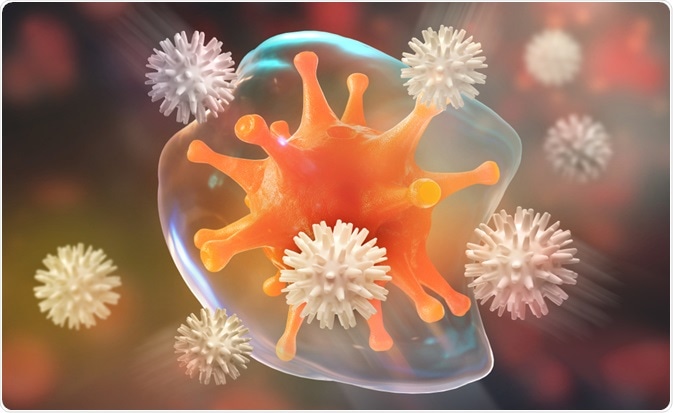Human antiviral immunity is vital to preventing serious illness following the introduction of a virus into the body. In mammals, antiviral immunity is a process of three stages. Here, we discuss these mechanisms and their role in combating the current SARS-CoV-2 pandemic.
 Image Credit: Yurchanka Siarhei / Shutterstock.com
Image Credit: Yurchanka Siarhei / Shutterstock.com
The three stages of the human antiviral response
To date, there is a rich body of research that demonstrates the function and processes of human antiviral immunity. It is well established that it involves a three-stage process. In humans, an innate response is evoked within the first few days following infection with a virus.
During this stage, complement, interferon (IFN), and natural killer (NK) cells are synthesized and released in what is considered to be the first line of defense against the invading pathogen. The impact of this first stage is the initial suppression of the virus by limiting its replication.
The second stage of the human antiviral responses initiates several days after exposure and peaks between days 7 to 10. This phase of the response is known as the CTL response, defined by the activation of cytotoxic T cells (Tc cells) which generate cytotoxic T lymphocytes (CTLs).
Studies have shown the efficacy of CTLs at eliminating almost all cell types as they recognize the class I major histocompatibility complex (MHC) molecules that are expressed by almost all cells, and can differentiate between those that are entities created by the body and those of an invading pathogen. CTLs target and eliminate entities such as viruses or mutated oncoproteins. This stage is considered to be the most crucial phase for eliminating and resolving an ongoing infection.
The third stage involves the release of antiviral antibodies from the immune system’s B cells. Each B cell produces are specific antibody, unique to the binding site of a particular antigen. These antibodies are not released immediately after infection, and, therefore, are only measurable later (usually 7 days).
However, they persist in the body for much longer than memory T cells and can linger in the body for years after the initial infection. This stage of the innate antiviral response is believed to protect the body from subsequent infections with the same virus.
Antiviral immunity and COVID-19
The SARS-CoV-2 pandemic currently presents a significant challenge to healthcare systems around the globe. Gaining a deeper understanding of the vital physiological and immunological processes that are involved in infections of COVID-19 and disease progression is fundamental for developing effective treatments and preventative methods against the virus.
Current research has identified the role of the immune system in SARS-CoV-2 infection. Studies have shown how SARS-CoV-2 interacts with the immune system, in addition to how dysfunctional immune responses contribute to disease progression. Below we discuss these mechanisms.
The human immune response and COVID-19
Recent evidence has revealed untuned antiviral immunity in SARS-CoV-2. As discussed above, IFN mediated antiviral responses are key to the first phase of the human innate antiviral response. However, studies have shown that IFN responses are diminished in patients hospitalized with pneumonia following SARS-CoV-2 infections who subsequently suffered from respiratory failure or death as a result of the infection.
As IFN mediated responses are vital to the body’s first line of defense and for minimizing the impact of the infection, the fact that these responses are reduced and/or delayed in those suffering severe health complications and who are at increased risk of death demonstrates the role of the immune system in influencing the outcome of infection with SARS-CoV-2.
Those who fail to generate an appropriate immune response seem to be at increased risk of becoming critically ill following infection with the virus.
In comparison, scientists looked at the immune responses of patients with flu who were also hospitalized for pneumonia and presented comparable clinicopathological characteristics to COVID-19.
They found that these patients demonstrated a robust IFN response, showing the specificity to diminished IFN-mediated immune responses to those with poor outcomes to COVID-19 infection. The data suggest that those with an untuned antiviral response in COVID-19 are more likely to suffer respiratory failure and even death.
Further studies into antiviral immunity and COVID-19 required
Further studies into antiviral immunity will be fundamental to furthering our knowledge on how to tackle the SARS-CoV-2 pandemic, and, in particular, they will give us vital insight into the underlying mechanisms that increase a person’s chances of becoming critically ill once infected with the virus.
In the coming months, as governments worldwide focus their efforts on controlling the spread of the virus, we can expect further data to emerge to help guide scientists and healthcare systems on how to improve patients outcomes and reduce mortality.
Along with crucial prevention strategies and vaccine development, antiviral immunity will be a key area of study in the fight against COVID-19.
Sources
Au, L., Boos, L., Swerdlow, A., Byrne, F., Shepherd, S., Fendler, A. and Turajlic, S., 2020. Cancer, COVID-19, and Antiviral Immunity: The CAPTURE Study. Cell, 183(1), pp.4-10. https://www.ncbi.nlm.nih.gov/pmc/articles/PMC7470737/
Chinchar, V., 2000. Ecology of Viruses of Cold-Blooded Vertebrates. Viral Ecology, pp.413-445. https://www.sciencedirect.com/science/article/pii/B9780123626752500124
Galani, I., Rovina, N., Lampropoulou, V., Triantafyllia, V., Manioudaki, M., Pavlos, E., Koukaki, E., Fragkou, P., Panou, V., Rapti, V., Koltsida, O., Mentis, A., Koulouris, N., Tsiodras, S., Koutsoukou, A. and Andreakos, E., 2020. Untuned antiviral immunity in COVID-19 revealed by temporal type I/III interferon patterns and flu comparison. https://www.medrxiv.org/content/10.1101/2020.08.21.20179291v1
Tay, M., Poh, C., Rénia, L., MacAry, P. and Ng, L., 2020. The trinity of COVID-19: immunity, inflammation and intervention. Nature Reviews Immunology, 20(6), pp.363-374. https://www.nature.com/articles/s41577-020-0311-8
Yan, N. and Chen, Z., 2012. Intrinsic antiviral immunity. Nature Immunology, 13(3), pp.214-222. https://www.ncbi.nlm.nih.gov/pmc/articles/PMC3549670/
Further Reading
Last Updated: Dec 22, 2020